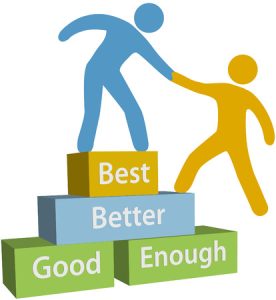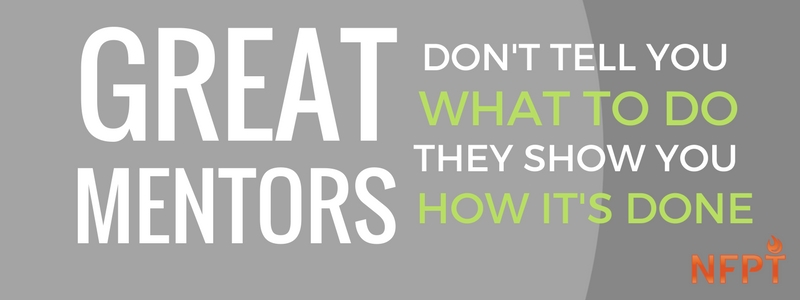
We can all name one or two influential teachers or mentors we had along our individual journeys when reflecting upon the progress we have made. To me, a mentor is a rare gem.
It’s been my experience that true mentors are those who do not openly boast their skills, but who quietly influence and unselfishly share knowledge and experience with new professionals. Something we can all strive for.
Mentors are indeed incredible. What about mentees?
Are You Mentor-able?
Being a mentor requires a special kind of patience, an unselfish perspective, and the ability to provide fair and balanced feedback. In other words, being a mentor isn’t a role every individual can successfully or effectively fulfill.
The same can be said for being an individual who is “mentor-able”. Not every person is ready to be mentored or to be shown the areas in which he or she can experience growth or the ways in which he or she can evolve into a stronger and more successful professional.
The ability to be mentored requires someone who is malleable, flexible, and willing. It is not a matter of “do you need to be mentored?” It’s a question of whether or not you are ready to be mentored. Do you have a growth mindset and willingness to learn new skills and soften your jagged edges? If you are, consider what you need to do to get the most out of being mentored.
Set Goals
Ask yourself what your goals are – personally and professionally. Do you want to become better with marketing? Do you want to strengthen your physical assessment skills? Or, do you simply lack confidence? Take a look at the areas of your life that might need some change and set realistic goals to communicate to your mentor about what you wish to learn.
Ask and Listen
Part of learning and evolving is asking questions. Do not neglect to ask the question, but make sure you listen for the answer. Most mentors will not give away the answer but will tell you where and how to find it. The idea is to develop critical thinking and problem-solving skills.
Observe
Mentors possess a wide variety of skills they acquired during their time as a professional. Observe everything from their interpersonal skills, conflict resolution tactics, communication practices, etc. Make note of what you like about the way they address a certain situation or solve a problem with a client. Create a “wish list of skills” you want to sharpen over time and with the help of your trusted guide.
Team
Build a team of mentors. Don’t limit yourself to one person. Seek out those who you respect and admire for their individual qualities and professional skills. Diversify your resources.
Be Honest
Mentors are people, too. It’s possible a mentor may let you down at some point. If that is the case, be honest and express your concerns in a respectful and professional manner. If you feel your mentor is asking you to sacrifice your integrity, don’t feel you need to remain committed to that person. The only thing you will ever truly own in life is your integrity and if you sell it, you cannot buy it back.
Accept Feedback
A good mentor will have the ability to guide and encourage while providing advice and feedback. Learn to take their feedback and apply it. Feedback doesn’t need to be offensive to be effective. Talk to your mentor about ways in which you like to receive feedback and build that relationship. Don’t make your mentor guess your needs and desires.
Be You
While your mentors may be at a point in their careers you wish to experience in the future, your path is different. You are different. You can and will achieve success by observing and applying their teachings, not by emulating them or putting them on a pedestal. Carve your own path towards your goals and leave your own footprints; don’t simply follow in theirs.
Show Gratitude
Thank your mentors and show your gratitude for their assistance in helping you grow and evolve in your career. A simple “thank you” note goes a long way.
Being mentored takes a certain level of maturity and willingness to grow in ways you likely have not yet considered. And, being mentored is rarely easy, but if you ask those of us who have mentored, we would say the same thing. Being a mentor is no small task.
The mentor-mentee relationship is built upon open, honest two-way communication, a common understanding of goals, and respect for each other and for yourself. Respect yourself, your role as a professional and find someone you respect to help you achieve the success you seek.
[info type=”facebook”]Tell us about a great mentor you’ve had. If you’re an NFPT trainer, join the Facebook Community Group to share and if you’re not, come chat with NFPT here![/info].

Dr. Erin Nitschke, NFPT-CPT, NSCA-CPT, ACE Health Coach, Fitness Nutrition Specialist, Therapeutic Exercise Specialist, and Pn1 is a health and human performance college professor, fitness blogger, mother, and passionate fitness professional. She has over 15 years of experience in the fitness industry and college instruction. Erin believes in the power of a holistic approach to healthy living. She loves encouraging her clients and students to develop body harmony by teaching focused skill development and lifestyle balance. Erin is also the Director of Educational Partnerships & Programs for the NFPT. Erin is an editorial author for ACE, IDEA, The Sheridan Press, and the Casper Star Tribune. Visit her personal blog at belivestaywell.com

